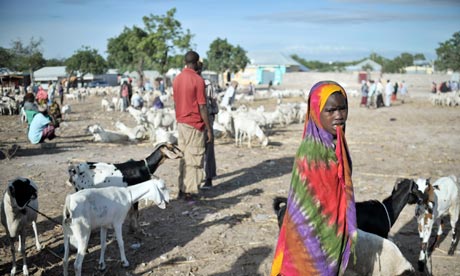Rushanara Ali

Bakara animal market in Mogadishu, Somalia, a former al-Shabaab stronghold. Photograph: Tobin Jones/AFP/Getty
Money transfer agents are vital for people trying to help those struggling in countries such as Somalia and Bangladesh
For 30 years, one of my constituents has been sending money to his family in Bangladesh and their neighbours. He also supports his widowed niece and her three children by paying their school fees and health costs.
They live in a remote part of the country, so he uses the local Bengali-speaking money transfer agent, based in Brick Lane in London, which has a network of agents and is able to reach towns and villages throughout the country, and at affordable rates. Other local agencies help those who originate from Somalia, Nigeria, Pakistan or India. I’ve heard countless stories of the invaluable help agencies have given when they’ve needed to send money to loved ones quickly on important occasions such as burials, weddings and for emergency hospital treatment. The support they provide really is a lifeline.
Barclays Bank has, however, recently decided to terminate its banking facilities for these agencies. This will badly hit an estimated 70% of such companies, which will have a devastating impact on thousands of families.
“There is simply no other legal way of sending money to remote areas in Somalia,” community activist Ayan Mahamoud told me. “We’re not just talking about families helping each other, we’re also talking about humanitarian aid organisations like Oxfam who use these services.”
Somalia is one of the poorest countries in the world, and the Dahabshill money transfer firm in my constituency is one of the only ways to send money there. Without banking facilities, Dahabshill would not be able to continue trading.
Two remittance agencies, Moneygram and Western Union, will remain unaffected by the Barclays move. But though they are the major players, their charges are often higher than the other operators, and they simply do not have the reach of some of the other agencies.
The remittance economy has had a hugely positive impact worldwide. The effect of floods in Pakistan in 2010 would have been far more harshly felt without cash donations from family members in developed countries.
Barclays is taking its action over concerns that money transfer agencies might not have the proper checks in place to spot criminal activity. The bank’s decision followed the imposition by US authorities of a $1.9bn fine on HSBC last year for poor money laundering controls. HSBC said last autumn it would get out of the money service sector entirely. Of course, it is right for Barclays to review of its procedures and take action against any criminal activities. But taking such draconian action means that potentially millions of innocent people across the globe will have their financial lifelines switched off.
Remittance flows reached $3.2bn from the UK in 2011, and $530bn worldwide in 2012 – greater than all the world’s development aid budget put together. Remittances cannot of course replace other forms of investment or aid, but it’s clear that they complement long-term international development.
Consequently, 45 Labour MPs and I have written to Barclays asking them to reconsider. Many of them have, like me, been approached by distraught constituents. We are calling on Barclays to provide some time and breathing room while the government and the regulatory agencies work out what action can be taken to save these businesses.
Other parliamentarians are concerned too. The all-party parliamentary group on Somalia and Somaliland has recently raised its own concerns to Barclays and the government regarding this decision, saying the service “provides an essential lifeline of support … especially in the absence of a formal public banking system in the country”.
Last week David Gauke MP, exchequer secretary to the Treasury, said the government is “working to seek to manage the impact this will have on businesses and communities in the UK,” but I fear this will be too little and too late.
I cannot think of a more vital, more effective lifeline for the developing world than remittance flows, and we need to oppose the closure of these firms. The wellbeing of so many people is at stake, not to mention the loss of trade pioneered by ethnic minority communities with links to their country of origin.
The alternative is sleep-walking into yet another avoidable disaster, and could have a devastating effect on developing countries and on efforts to alleviate poverty among some of the most disadvantaged people in the world.
Rushanara Ali is a British Labour Party politician and Associate Director of the Young Foundation, who has been the Member of Parliament (MP) for Bethnal Green and Bow since 2010.













